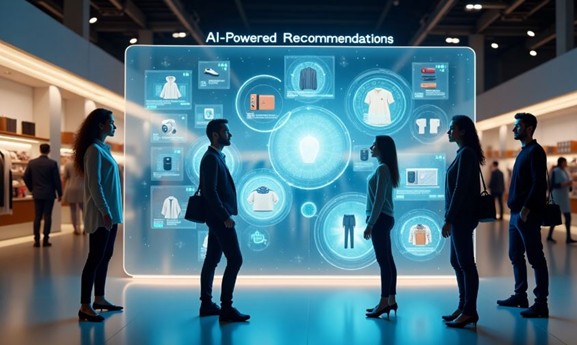
The AI Shopping Cart is transforming the e-commerce or online shopping landscape. AI is no longer something that can only be heard or read about. However, it is a real tool implemented in various technology global economic industries, including e-commerce. AI’s applications in online stores range from general recommendations of products to price optimization and virtual assistants. In the modern environment in which businesses have more competitive conditions, it is not possible to consider personalization as an addition but rather as crucial. In this article, we will explore the AI Shopping Cart Revolution.
1. The Role of the AI Shopping Cart in E-Commerce
The definition of Artificial Intelligence is purposely made to think and operate like a human brain through the use of datasets and algorithms. In the case of e-shopping, this refers to past and current activities in the preferred shopping sites, items viewed, observed, and written on wish lists, the number of times a page is clicked, and the time spent on such pages, their social media activity, among others.
Today’s retailers have access to huge amounts of data about customers. In Whirl, this raw data is analyzed and converted into useful information that platforms can use to form each interaction based on what matters to a specific shopper.

2. Smarter Product Recommendations Through the AI Shopping Cart
We encounter the most useful application of artificial intelligence in e-commerce in the suggestion of products. Whether you buy a new piece of clothing or book a cab from an app, the system recommends items close to what impressed you or how you were before—that’s AI.
Engine Behind the Experience
Several models used in recommendation engines include collaborative filtering, content-based filtering, and hybrid models. These consider many parameters to offer you odds on what you will likely click or buy online. For instance, if you type running shoes in the search engine, you may be provided with associated athletic clothes and equipment or special offers for a few days only. All in all, it becomes more accurate with constant use and evolves under its user’s behavior

3. Dynamic Pricing Based on Customer Behavior
AI has also changed the pricing concept since some products change prices depending on customer behavior, time, and competition, among other factors. For consumers, this means that price is more in tandem with value since the rates charged by the firms are more competitive.
For instance, if the customer has recently visited the site and watched a particular item, the system may give the customer a discount to make the purchase. On the other hand, it may hint at some prevailing high demand and decide to maintain a high price to protect the margins on the inventory.
4. AI Shopping Cart Assistants: Chatbots and Virtual Shopping Assistants
It is very important to understand that online shopping is not just the process of buying goods; it is the process of getting help. Customers benefit from Artificial Intelligence Technologies through chatbots and virtual shop assistants regarding consultation, assistance at checkout, and recommendations. Some of the key functions of AI shopping assistants include:
- Answer product inquiries instantly
- Offer personalized product suggestions
- Assist in returns and order tracking
- Guide users through promotional offers
Today’s Artificial Intelligence-based bots can be quite realistic in their response and learn from every conversation they have. In short, big brands like Sephora and H&M have adopted Facebook Messenger bots. They greatly enhance customers’ experience and lower cart abandonment chances.
5. Visual and Voice Search: Changing How We Shop
AI also influences how customers conduct searches when looking for products to purchase. Organic search based on keywords is not only displaced or supplemented by modern visual and voice searching technologies.
In a visual search, one has to take a picture of an item, followed by the AI platform searching for other articles similar to it and available in the market. Voice control is also gaining popularity among users, which is a new approach to shopping. The convenience for the consumers is that with devices like Google Assistant and Amazon Alexa, customers can place orders verbally.
6. AI Shopping Cart Marketing: Personalized Marketing That Resonates
By its ability to target consumers and not internet users, AI has made personalized marketing even more effective and far less invasive. In addition, this is not a promotional email that gives you a bare link or any simple text telling you to click this link if you want to make money online or to buy our product. However, AI provides you with customized campaigns that are relatable to your history of activities. Three common forms of AI-driven personalized marketing include:
- Custom email campaigns based on browsing/purchase history
- Smart retargeting ads across different platforms
- Product alerts (like restocks or price drops) tailored to your wishlist
The result is better engagement, improved conversion rates, and a more valued customer experience.

7. Predictive Analytics and Customer Retention
AI takes it a notch higher and tries to anticipate what the customers would require next. A recent implementation of this foresight called predictive analytics assists retailers in keeping good relations and customer loyalty.
For instance, since people use the purchase cycle plan, AI may forecast when they will be depleted in a specific consumable product like vitamins or skin cream, and then suggest a replacement notification. Likewise, it may know when you are on the verge of cart abandonment and offer you a discount code valid only for a limited time.
8. Back-End Personalization: Inventory and Logistics
This is why personalization, though most apparent on the surface, also improves back-end functionality. It predicts product demand. Likewise, it reorders products on behalf of the client to replenish stocks. In addition, it manages the delivery chain. Finally, it ensures that products are available when demand peaks at the right time and place.
9. Ethical Use of AI and Data Privacy
The current wave of AI accessibility to personalize many aspects of life and business needs to do so with consideration for personal privacy. In addition, e-commerce platforms should use customers’ information appropriately and handle the data responsibly.
- Retailers must ensure:
- Clear communication about data usage policies
- Affordable ways through which the clients can step outside themselves in the campaign tracking process
- Espionage protection to decrease the threats of hacking
It is self-explanatory that trust underpins virtually all personification endeavors in a great way. Hence, AI will play a long-term role in e-commerce. It will do so if businesses combine intelligence and integrity perfectly.

Final Thoughts: Why the AI Shopping Cart Is the Future of Online Retail
AI is no longer a tool that complements people’s shopping experience; it is redesigning this sphere. AI recommends products to buy and prompts customers to purchase them. From decisions based on consumption patterns to offering insights regarding those patterns. Each step is becoming more personal. Moreover, each step is becoming more intelligent. The customers are at the helm of affairs.
Also read https://ambitioninside.com/shopping-chatbots-how-ai-is-making-e-commerce-smarter/ and share your thoughts.
Umaimah is an SEO content writer and digital creator with 5+ years of experience. She is the founder of Ambition Inside, where she writes about personal growth, mindset, entrepreneurship, and meaningful ideas to help readers think clearly and grow intentionally.
Pingback: SEO and PPC Synergy: Best ROI for Businesses
Pingback: Future of Innovation: Key Trends Shaping the Next Decade - ambitioninside.com
Pingback: Content Production Gets Smarter: Top AI Tools for Digital Marketers
Pingback: Shopping Chatbots: How AI Is Making E-Commerce Smarter